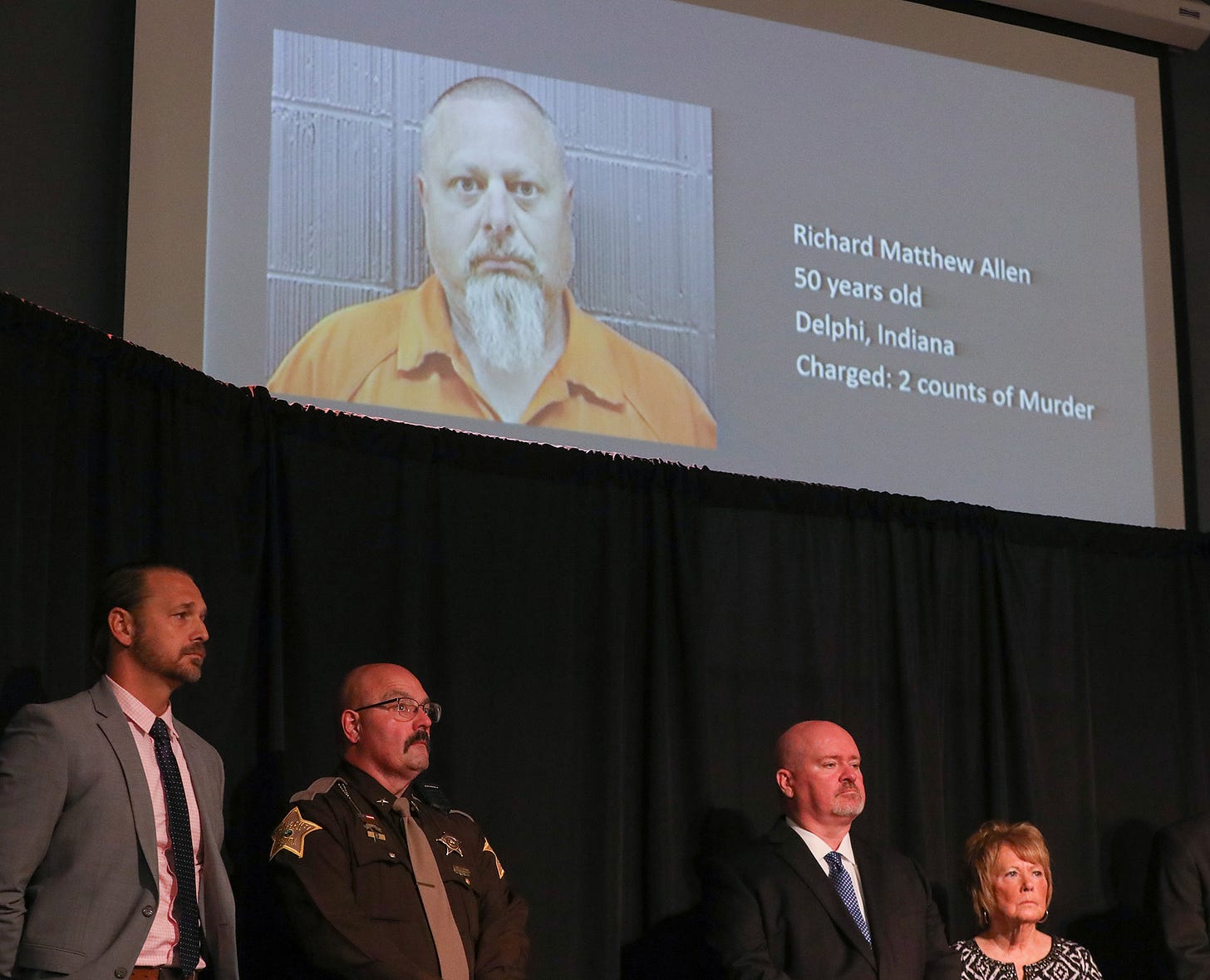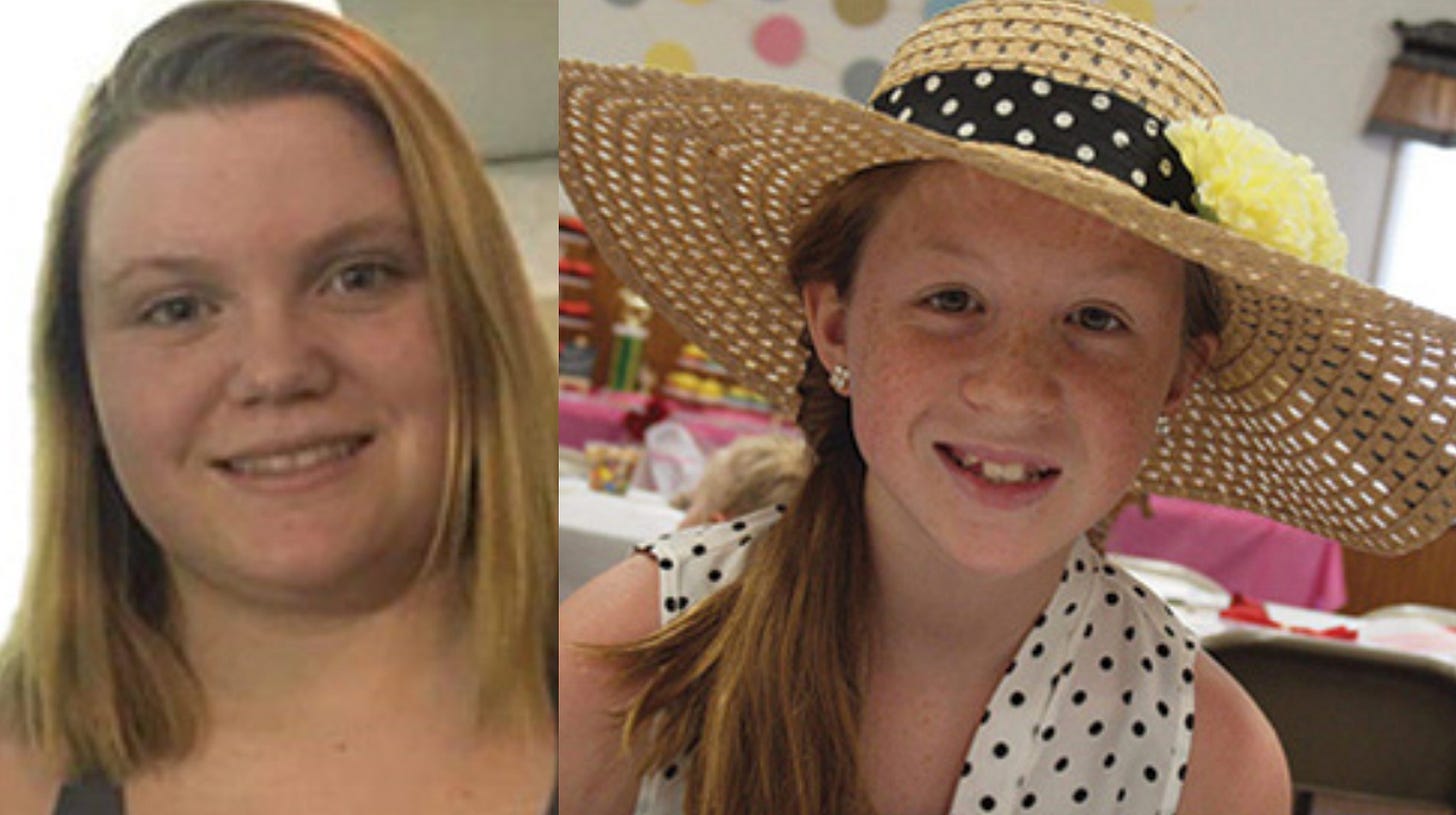Judge grants delay in bail hearing in Delphi murder case
Plus, TEDxPurdueU returns, in full and in person, Saturday. And other reads, including Mitch Daniels biting back after critics circled his potential Senate run
A bail hearing initially set for Friday morning will wait, after attorneys for Richard Allen – accused in the 2017 murders of Delphi teens Libby German and Abby Williams – asked last week for more time.
On Thursday, Judge Fran Gull agreed to continue the hearing, with plans to meet with attorneys on both sides Friday afternoon to set a new date.
Brad Rozzi and Andrew Baldwin – attorneys for Allen, 50, of Delphi – had asked for more time to prepare for a bail hearing. They contended in a Nov. 21 filing that the prosecution’s case was too weak to justify holding Allen without bond until the trial. Allen has been in custody since he was arrested and charged in late October.
Carroll County Prosecutor Nick McLeland argued in an early-February response that the evidence is strong enough to deny bond in the murder case. (Both sets of arguments are in here: “Prosecutor argues for no bail for Delphi murder suspect Richard Allen.”)
Abby and Libby, eighth-graders at Delphi Community Middle School, were killed Feb. 13, 2017, while on the town’s Monon High Bridge Trail. The prosecutor’s probable cause affidavit, filed with charges against Allen, tie the suspect to the scene through his own admission about being on the Monon High Bridge that day, owning clothing similar to that worn by a man seen on the bridge in video shot on Libby’s phone and the discovery of an unspent bullet found at the scene that investigators say has the markings from a gun found at Allen’s home.
Friday’s hearing also was supposed to weigh a potential trial date for Allen. It wasn’t clear from Gull’s ruling whether that would be set Friday afternoon. Gull already has ruled that the trial will be held in Carroll County, with the jury pool pulled from Allen County, home of Fort Wayne.
READY TO TALK SATURDAY: TEDxPurdueU
Heading into its 10th TEDx conference Saturday on campus and living squarely in a podcast-primed world, the students behind TEDxPurdueU are ready for the first, fully live event since a few weeks before the COVID shutdown in spring 2020.
“There’s only two people on our crew right now who were at that 2020 event,” Bridgit Arnold, a Purdue senior and executive director of the student-run TEDxPurdueU, said. “There’s a lot of anticipation, as in, What’s this thing all about?”
What it’s all about, in a broad sense, is an extension of TEDx events dedicated to “ideas worth sharing,” featuring a series of speakers offering talks of 18 minutes or fewer, band performances and chances to network, all tied to an overall theme.
The theme Saturday: Terrarium.
“It’s intentional broad, intentionally vague,” Arnold said. “The talks we want people to give don’t necessarily have to tie in perfectly. When we curated speeches, we wanted people to talk about what they know. … When you’re thinking about themes regarding terrariums, I think of cultures and systems and things that are working together in an overall environment – in this case, how, philosophically, things and ways of thinking exist more broadly in the world.”
THANK YOU FOR SUPPORTING BASED IN LAFAYETTE, AN INDEPENDENT, LOCAL REPORTING PROJECT. SUBSCRIPTION OPTIONS, FREE OR FULL-RIDE, ARE READY FOR YOU HERE.
Among the speakers Saturday:
Luis Jiménez-Rodriguez, a professor in the School of Theology at Pontifical Catholic University of Puerto Rico and author on topics about engineering ethics, artificial intelligence and what he calls the points of contact between the neurosciences, philosophy and religion. His talk: “Complexity and Emergence.”
Michael Luongo, a doctoral student in Purdue’s School of Tourism and Hospitality, researching tourism recovery in the context of conflict. His talk: “Looking into the Terrarium After War: Rebuilding Tourism in Conflict Zones and Reconnecting War-Torn Places to the World.”
Eric Schurenberg, editor-in-chief of the Amplify Publishing Group and former CEO of Inc. and Fast Company. (Fast Company is the publication that has touted Purdue as a “Brand That Matters” for a second consecutive year.) His talk: “How To Be an Ally for Truth.”
Ben Westoff, an investigative reporter who recently published the book, “Fentanyl, Inc.: How Rogue Chemists Created the Deadliest Wave of the Opioid Epidemic.” His talk: “There’s No Way to Stop Drug Smuggling Anymore.”
Hatam Tamimi, a Purdue doctoral student in linguistics who grew up speaking Arabic and signing a sign language that emergence in his family after his father lost his hearing. His talk: “How a Language Was Born (And How It’ll Die).”
IF YOU GO: TEDxPurdueU: Terrarium starts at noon Saturday, Feb. 18, at Loeb Playhouse in Purdue’s Stewart Center. Tickets: $15 for children and Purdue and Ivy Tech students, $20 for adults. Tickets available at the Stewart Center box office, by calling 765-494-3933 or online via this link from Purdue Convocations.
OTHER READS …
DANIELS BARKS BACK: Adam Wren, writing for Politico, had Mitch Daniels on the line this week, after the former Purdue president backed away from a potential U.S. Senate run. Daniels took a few jabs at former U.S. Rep. David McIntosh – head of the Club for Growth, the conservative group that made a broadside ad targeting Daniels as he was making up his mind about the run. It’s worth a read. Here you go: “Mitch Daniels rips his critics after backing away from Senate bid.”
BANDARAS POINT, IN THE WORKS: WLFI reporter Joe Paul pulled together more details on plans for an events center, 5,000-seat arena and RV campground near the intersection of Interstate 65 and Indiana 28 – a spot Frankfort and Clinton County officials have been dreaming about developing for years. The project from Good Oil Co., which has a travel stop near the I-65 exit just south of Lafayette, follows plans for a roundabout and other road work on Indiana 28, on the east side of the intersection. Here’s Paul’s report: “New agri-tourism development planned for I-65 exit near Frankfort.”
NEPOTISM QUESTIONS FOLLOW DIEGO MORALES’ LATEST HIRE: Indianapolis Star reporter Arika Herron had this story, summed up pretty, outrageously well with this headline: “Secretary of State Diego Morales hires brother-in-law.” The upshot: Morales, elected in 2022 under a cloud of questions about his qualifications, hired his brother-in-law Shawn Grady to a six-figure salary to be co-director of the Auto Dealer Services division. Herron unwraps some of the ethical and legal questions trailing the secretary of state now. Here’s a link. Indiana Capital Chronicle reporter Whitney Downard followed up with this: “Critics slam Morales for hiring brother-in-law.”
CAMERAS IN THE COURTROOM: The Indiana Supreme Court this week said local judges would be allowed to decide whether media would be allowed to take pictures, record or broadcast in courtrooms, starting May 1. “Trial court judges are in the best position to determine how to balance the importance of transparency while protecting the rights of people involved in a court matter,” Chief Justice Loretta Rush said in a statement with Wednesday’s order. The move comes after a 2022 pilot project in four counties – including in Tippecanoe Circuit Court – to test how things went when credentialed news media were allowed in the courtroom with cameras and recording equipment. In Tippecanoe County, access came with rules and caveats, including notifying the court in advance. The Supreme Court order came with many of the same, including no footage or photos of jurors, witnesses with safety concerns or minors. The order also left access up to the discretion of judges. For more, here’s a report from the Associated Press.
BILL TARGETS TEACHERS, SCHOOL LIBRARIANS: Indiana Capital Chronicle reporter Casey Smith had a wrap-up of a series of contentious school-related bills, including one that would strip teachers and school librarians of legal protection if they distributed books and materials deemed harmful to kids. Here’s a look that boils down hours of committee testimony this week: “Tensions rise at Indiana Statehouse over bill targeting “harmful” library materials for minors.”
THANKS FOR SUPPORTING INDEPENDENT, LOCAL REPORTING.
Tips or story ideas? I’m at davebangert1@gmail.com. Also on Twitter and Instagram.









Indiana Republican politicians hate public schools, hate librarians, hate books, and hate any idea that doesn't center them (old white men).